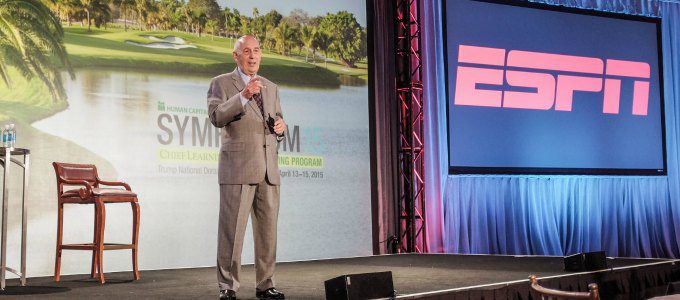
Take it from ESPN's founder: Asking questions is a great way to develop yourself, as well as your projects.
by Ed Cohen
April 20, 2015
Bill Rasmussen, founder of ESPN, presents at Spring CLO Symposium. (Photo by Will Byington Photography.)
I attended the Spring CLO Symposium and had the opportunity to meet with many learning leaders and take video several of them answering one simple question: What is the most significant development opportunity you have experienced?
Over the next several months, I will bring you those videos as they share their most significant development and specifically how it helped them to become better leaders. Let’s start with Bill Rasmussen. Rasmussen is not currently a learning leader and has never been one. He was one of the keynote speakers at the conference and is the founder of ESPN. In case you are one of the few in the world who have never heard of ESPN, it is the 24/7 all spot television channel, founded in 1980 and sold to ABC in 1984 for $185 million and then to Disney on 1995. Today, it is worth an estimated $50 billion USD.
Rasmussen lives in Tampa and came to Miami to speak at the conference. He arrived several hours early, providing a perfect opportunity for me to catch a few moments of his time. I asked him my single question, to which he replied that asking questions is how he had developed himself.
You can’t ask just any question. The questions need to be open ended to allow for the most thoughtful response. Instead of asking if the project was a success, you could ask, “What three things contributed to the success of the project?”
All too often, we get caught up in the speed of the day and then give out the short answers to our questions when a deeper, more thoughtful conversation could have results in a coachable moment for you. That’s why I agree with Rasmussen. Asking questions that elicit further dialogue becomes a learning experience.
Here’s how the project discussion could go:
You: What three things contributed to the success of the project?
Other person: We were able to meet the deadline because we had all the resources we had asked for, the internal client was happy with the outcome, and the team learned some new ways of tackling business issues along the way.
You: Could you tell me more about the new ways of tackling business issues?
You see what I mean? Of course, you won’t use this for every conversation you have unless you have nothing better to do with your time, which I doubt. That said, it can be a powerful development technique when you want and need to know more about a topic.
After interviewing Rasmussen, I observed this happening all over the Symposium. People were together in small groups asking each other all sorts of questions, confirming that learning does not happen at just the general sessions and breakouts. Learning while attending the CLO Symposium is highly encouraged in order to be extensive and continuous.



